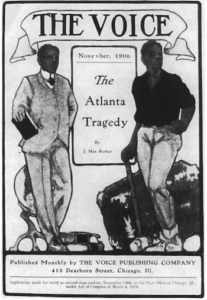
*The Voice of the Negro is celebrated on this date in 1904. This was a literary periodical aimed at a national audience of African Americans.
The Voice of the Negro was the first African American periodical based in the South. It was initially published in Atlanta in 1904 and created by Austin N. Jenkins, the white manager of the publishing company J. L. Nichols and Company. However, he left complete control and responsibility over the magazine to the Black editors John W. E. Bowen, Sr., and Jesse Max Barber.
Barber and Bowen aimed for the magazine to include "current and sociological history so accurately given and so vividly portrayed that it will become a kind of documentation for the coming generations." Atlanta had many Black institutes At this time, so the editors also strove to uplift the Black literary and political voice there. The periodical published writing by Booker T. Washington and work by a younger generation of Black activists and intellectuals: W. E. B. Du Bois, John Hope, Kelly Miller, Mary Church Terrell, and William Pickens. It featured poetry by James D. Corrothers, Georgia Douglas Johnson, and Paul Laurence Dunbar.
The editors wanted the magazine to be ideologically and politically independent to avoid partisan affiliation and mediate the divide in the Black community between W.E.B. DuBois and Booker T. Washington's differing ideologies. However, Booker T. Washington sought to influence the magazine and had his secretary, Emmett Jay Scott, become an associate editor. For the first volume, the editors stayed balanced and published contributions from DuBois and Washington.
Scott eventually left the editorial board due to a conflict between Washington and the editors. The editors still wanted to stay neutral for the second volume, but from the Spring of 1905 on, the magazine became publicly anti-Washington. There was a lot of racial violence in Georgia at the beginning of the 20th century, but the event that impacted the magazine the most was the Atlanta Massacre of 1906. It relocated to Chicago and ceased publication in 1907.